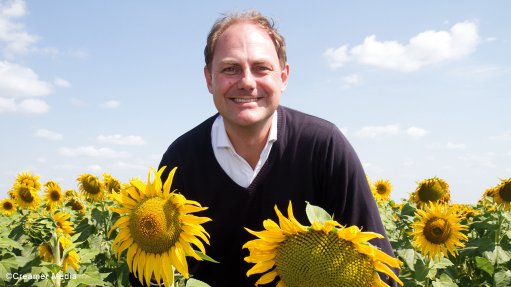
The careful preparation of clay-rich soils in Limpopo has enabled farmers to cultivate sunflowers without irrigation for the production of edible oil, enabling the sustainable growth of this crop in a water-scarce province, says global consumer goods company Unilever South Africa commodities procurement manager Ashton Eastman.
About 35 farmers in the Mookgophong region of Limpopo are part of Unilever’s sustainable sunflower farming initiative, which it supports to secure the production of sunflower oil for margarine. About 27 000 ha is under cultivation and a further 12 farmers and another 8 000 ha will be added to the project this year.
This project falls under Unilever’s Sustainable Living Plan, which aims to reduce the impact on the environment resulting from Unilever’s operations and consumers using its products.
Each of the farmers must meet or exceed Unilever’s sustainable agricultural code, which sets out detailed specifications for fertiliser and pesticide use, labour practices, irrigation and soil testing and preparation, besides others, to maintain soil fertility and reduce agricultural impacts on water.
The farmers enjoy a stable market for sunflower seeds produced, while Unilever is able to source almost 40% of its sunflower seeds in South Africa from a sustainable source. It aims to produce 100% of its locally used sunflower oil from sustainable sources by 2020, and there is quickening interest in Europe for sunflower seeds produced in South Africa, says Unilever South Africa chairperson Marijn van Tiggelen.
Water is the main challenge faced by farmers and takes precedence overall other challenges, including doves as minor pests, notes Welbekend farmer Bennie Genis.
“Water is probably the first of four main challenges. Owing to this, timing is crucial in planting our crops and preparation of the soil is also critical, as we aim to retain as much moisture in the soil as possible from the 500 mm of rain we receive a year.”
The past five years have been wet and the farmers expect the next few years to be dry, with yields averaging 600 kg/ha to 800 kg/ha, down from 1.5 t/ha, he says.
However, sunflower cultivars provided by Unilever’s partners are being tested on the farms, with preliminary findings indicating that yields per hectare and the oil content of the seeds are higher than the yields and oil content of traditional sunflower cultivars, providing commercial benefits for the farmers and Unilever, says Central Edible Oil Company operations director Pieter Swanepoel.
“The cultivars are bred and are not genetically modified,” says Eastman, declining to elaborate on the origins of the cultivars and Unilever’s cultivar partners.
“The Unilever sustainable agricultural code makes farms more robust against labour and economic conditions, as it emphasises knowledge, conservation, sustainability and frugality,” says Zandfontein farmer Edward Leversage.
“While sunflower farms are mechanised, owing to the scale of farming and harvesting needed to sustain sunflower farms economically, the benefits of sustainable farming under the Unilever code in the Mookgophong area since 2011 means that we have never needed to lay off any people. We have also increased the hectares under cultivation and foresee good demand and growth, which will sustain the livelihoods of people working on the farms,” concludes Leversage.